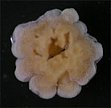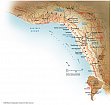Natural products from actinomycetes
The spread of drug resistances and the occurrence of multidrug resistant bacteria such as MRSA and VRE are one of the main threats of the 21th century. Therefore, it is inevitable to find new substances or to use new strategies and detect new targets to overcome resistances.
Actinomycetes are a proven source of anti-infective natural products. A significant part of the antibiotics and antifungals used in the clinic today were discovered from actinomycetes (e.g. Vancomycin, Erythromycin, Tetracyclin, Amphothericin B, Nystatin). We work on these microorganisms in several projects.
Past Projects
MiMo_ALe - Antiinfectives from Moroccan Actinomycetes

The aim of this project was the isolation and characterization of novel anti-infective secondary metabolites from these microorganisms. After the isolation of novel strains from currently under-researched Moroccan habitats (e.g. endophytes of aromatic plants or macroalgae), we screened the isolated strains for anti-infective activities in collaboration with our Moroccan partners. Promising strains have subsequently been cultivated in larger scale. After extraction of these cultivations, the bioactive compounds were isolated, their structure elucidated, and the biological activity characterized in more detail.
We placed our focus especially on compounds with activity against multi-resistant pathogenic bacteria and fungi activity.

The project has been financially supported by the BMBF (2018-2019) and pursued by Dominik Wichner.
Co-operations:
- Prof. Dr. Mustapha Barakate; Cadi Aayyad University, Marrakesch, Marokko
- Prof. Dr. Heike Brötz-Oesterhelt; Interfakultäres Institut für Mikrobiologie und Infektionsmedizin, Universität Tübingen
Quorum Sensing Inhibiting and antibacterial natural products

The interference with bacterial virulence by inhibition of e.g. bacterial quorum sensing is an innovative approach for the development of novel antiinfectives. Additionally, we look for “classical” antibacterial natural products, with special focus on hydrophilic compounds.
In this project, we work with the famous Tübinger actinomycetes strain collection as the basis for our screening. After an intensive screening for quorum sensing inhibitors and antibacterial compounds, promising strains have subsequently been analysed in detail in order to finally isolate the bioactive compounds, followed by their structure elucidation, as well as the characterisation of their biosynthesis.

The project has been financially supported by the DZIF (2015-2019) and pursued by Dr. Nico Ortlieb.
Cooperations:
- Prof. Dr. Heike Brötz-Oesterhelt; Interfakultäres Institut für Mikrobiologie und Infektionsmedizin, Universität Tübingen
- Prof. Dr. Harald Groß; Institut für Pharmazeutische Biologie, Universität Tübingen
- Dr. Steffen Lüdeke; Pharmazeutische und Medizinische Chemie, Universität Freiburg
Antiinfective compounds from Atacama Desert actinomycetes

The Atacama Desert in Chile is the oldest and driest desert on earth. Our collaboration partner, M. Goodfellow from Newcastle University, UK, has isolated about 300 actinomycete strains from extreme hyper-arid and saline sampling sites. These strains, many of them from so-called rare actinomycete genera, are currently screened for production of novel metabolites. Furthermore, primary screening of these actinomycete strains for activity against the microorganisms B. subtilis, S. aureus, E. coli, P. fluorescens, and S. cerevisiae has indicated antiinfective activity of several strains. We have isolated a number of interesting compounds from these strains that will be characterized in more detail in future projects.

This project has been supported by the DZIF.

